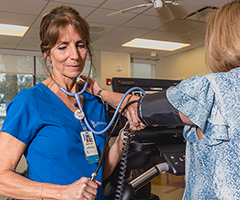Angina (Chest Pain)
Lee Health: Experienced Cardiology Specialists Helping You Understand and Treat Your Angina
Lee Health offers all of the most advanced treatments available for angina pectoris and coronary artery disease. With compassionate care and years of experience, our team is ready to help you manage and treat your angina and improve your quality of life.
-
Cardiac Critical Care
At the first sign of a heart attack, every second counts. Our emergency cardiac care team is available 24 hours a day at our four adult hospitals.
What is angina (chest pain)?
Angina (or angina pectoris) is chest pain that is caused by insufficient blood flow to the heart muscle. Your doctor calls this insufficient blood flow "myocardial ischemia." Angina is a symptom of coronary artery disease (CAD), also known as coronary heart disease (CHD) an happens when something blocks your arteries or there is not enough blood flow in your arteries to bring oxygen-rich blood to your heart.
There are different types of angina:
- Stable angina: The most common type of angina. This happens when the heart is working harder than usual but has a regular pattern.
- Unstable angina: The most dangerous. It follows no pattern and can occur without physical exertion and is a sign that you may have a heart attack soon.
- Microvascular angina: Chest pain without any artery blockage. This is caused by your smallest coronary arteries not working the way they should.
- Prenzmetal's Angina (Variant angina): The rarest angina and happens when you are resting.
Get medical help right away if you have new, unexplained chest pain or pressure. If you have had angina before, call your health care provider.
Angina Symptoms
People with angina pectoris may experience pain in different ways:
- Chest pain
- Feeling of pressure, tightness or squeezing in the chest
- Increased pain when emotional or anxious
- Increased pain during exertion
- Pain in the back, neck, jaw or shoulders
- Pain in the arms, especially the left arm
- Pain in the upper abdomen
-
Cardiology - Heart Institute at Bass Road
-
Cardiology - Heart Institute at Sanctuary
-
Cardiology - Heart Institute at Medical Plaza One
-
Cardiology - Heart Institute at Metro Parkway
-
Cardiology - Heart Institute at Coconut Point
-
Cardiology - Heart Institute at Cape Coral Hospital
Angina Treatment Options
Before your chest pain can be treated, your doctors will need to determine its cause. Several tests may be done, including an electrocardiogram (EKG), stress test, or angiogram.
In many cases, chest pain is caused by coronary artery disease. In coronary artery disease, plaque builds up on the walls of your arteries, restricting blood flow to your heart.
When this happens, cardiologists at Lee Health provide several possible angina treatments.
- Medication. Patients with early coronary artery disease may obtain good results from treatment with various medications.
- Balloon angioplasty. A thin catheter is inserted through a blood vessel in your leg. It is then threaded up to the blockage. A tiny balloon is then inflated, pushing fatty deposits to the sides of the blood vessel and restoring blood flow to your heart. Lee Health also offers laser angioplasty, which breaks down plaque with a laser.
- Coronary artery bypass surgery. In a coronary artery bypass graft, a blood vessel from another part of your body is used to go around, or bypass, a blocked artery that supplies your heart. A stent—a miniature wire-mesh tube—can be used to open up a blocked artery. Stents are placed during a minimally-invasive procedure.
What is Lee Health's approach to treating angina?
HealthPark Medical Center, Gulf Coast Medical Center, Cape Coral Hospital, and Lee Memorial Hospital have been recognized as fully accredited Chest Pain Centers, with "door-to-balloon time," (the time from when a patient with a heart attack arrives in the emergency department until that person's coronary artery is re-opened with a balloon catheter), consistently beating the national standard. This level of care greatly increases a patients chance of survival from a heart attack.
Who should I contact?
For questions related to cardiovascular care or services, email us at hearts@leehealh.org
Having chest pain?
In a life-threatening emergency, call 911 or your local emergency number. If you are unable to do so, ask someone to call for you or to take you to the nearest emergency care facility. You may go to any hospital in your area for emergency care.






















































































